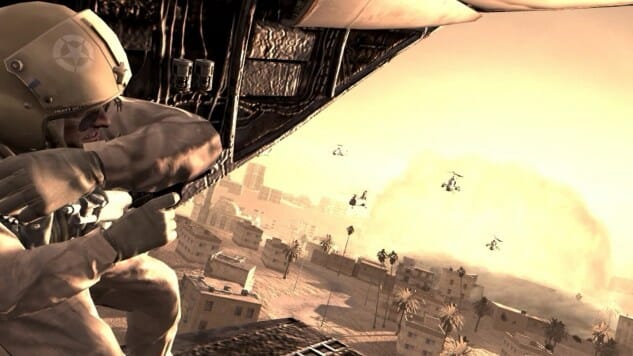Shock and Awe: The Political Influence of Modern Warfare

It’s hard to remember how risky Call of Duty 4, now singularly known as Modern Warfare, seemed when it initially came out in 2007. Despite President Bush declaring “Mission Accomplished” in 2003, the US was in the middle of a protracted occupation in Iraq, one that seemed to escalate further every day under the US’s larger “War on Terror.” Activision, the game’s publisher, also reportedly didn’t want the game to be set in the modern era, preferring the financial safety of the World War II setting the series had been known for until that point. The game itself took pains to avoid referencing modern theatres of conflict, with locations within the game simply designated as anonymous Middle Eastern countries rather than pointing out specific locations. It’s also easy to forget how transgressive Modern Warfare felt at the time. Its opening events held you captive as the leader of a Mid-East country in the middle of a coup, repurposing the techniques popularized by Half-Life’s tram to march you through a city being torn apart, and ultimately, to your own execution.
In 2007 this elicited a genuine sense of shock. Player agency was, and still is, often held as a sacred tenet of games, and to not only take away that agency, but kill the player, felt violating. This reached its peak in the now infamous “Shock and Awe” mission. It seemed like a sardonic response to the idea of using overwhelming military force to break an enemy’s will. As a tactic used to justify the initial waves of bombings during the Iraq war, there’s a sense of irony in a mission that responds to your “success” with a nuclear retaliation, not only killing the entire deployed military force, but forcing you to witness the aftermath as you slowly die from radiation.
This scene is paired with missions such as “Death From Above,” in which you operate from the view of a gunship monitor. Between the ghastly glow of the infrared camera, and the casual commentary of the operators, there’s a distinctly unsettling atmosphere that seems to question the effects of an increasingly detached and remotely fought war. It’s made more horrific by parallels with real life drone strikes, particularly the July 12, 2007 Baghdad Airstrike, where a group of largely unarmed people, including two journalists and children, were killed in a US drone attack. Footage of the attack was eventually released in 2010 by WikiLeaks, with a line of conversation that felt uncomfortably familiar. Wikileaks founder Julian Assange compared it to a computer game, saying, “Their response is: come on buddy, we want to kill you, just pick up a weapon … It appears to be a desire to get a higher score, or a higher number of kills.”
While comparisons between drone warfare and videogames may often remove some of the nuance, there’s plenty to be said about videogames’ relationship with the military. Game controllers have been used to control drones, and licensing of real firearms within games, including Call of Duty, have driven both awareness and sales of guns. This came to its peak in 2014, where a writer who previously worked on Black Ops 3 suggested that the military brainwashes people into accepting unpopular military activity by using videogame style marketing.
This last point is probably the most contentious part of Modern Warfare’s legacy as the series has seemed to lean further into jingoism and American exceptionalism. Follow-ups to Modern Warfare have rapidly escalated the scale of their conflicts, moving into Cold War nightmare scenarios. With this has come a sense of military tech fetishism and a series of spiritual sequels to “Shock and Awe,” each seeking to present a new atrocity to horrify the audience, but instead cheapening the impact of the original. When Modern Warfare 2 released in 2009 the series had you participating in civilian massacres, shooting up favelas, and destroying the international space station as collateral in a plot to intentionally detonate a nuke over Washington D.C.. The taboo of representing modern combat seemed to wane as well, with Modern Warfare 2 having both an introduction and multiple missions set in Afghanistan.